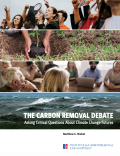
Among the identified pathways in the 2018 IPCC report for keeping warming below either 2.0°C or 1.5°C, almost all require the deployment of still speculative carbon removal and storage methods. However, most carbon removal methods remain at the preliminary research and assessment stage, with a great deal of uncertainty over their technical feasibility, social acceptability, cost, and associated impacts. In addition, some argue that the reliance on unproven carbon removal methods to fulfill climate policy goals creates a false sense of complacency about the need for an immediate and aggressive transition away from fossil fuels. This report looks at why the entire field of carbon removal needs additional scrutiny and how to build a better carbon removal conversation.
The cheap power purchase agreements (PPAs) for two recent concentrating solar power (CSP) projects in Australia (Aurora) and Dubai (DEWA IV) raise questions of how such low costs can be achieved and whether this could mark the commercial breakthrough of this technology. This paper investigates these projects with the information available and seeks reasons for the low PPAs.
This report aims to: (1) Understand the perceived benefits and risks, including ethical issues, as well as the levels of acceptance and support for joint projects in renewable energy (concentrated solar power and wind energy projects) among the public in various EU countries; (2) Understand the motives for potential rejection of cooperation mechanisms; and (3) Explore the determinants of public acceptance and support for cooperation mechanisms. It examines public perceptions of two potential joint projects set up under the Renewable Energy Directive in Spain, Germany, the Netherlands, and Romania.
The Millennium Challenge Account-Indonesia was implemented the Green Prosperity Project from 2013 to 2018, with the support of the Millennium Challenge Corporation (MCC). The project demonstrated the feasibility of reducing GHG emissions from palm oil mills by generating renewable electricity from palm oil mill effluent. This paper presents lessons learned from these efforts and identifies the potential benefits of replicating these efforts at additional mills.
This report summarises key aspects of the United States’ energy landscape and addresses each stage of the supply chain for fossil fuels, discussing in detail the subsidies and other measures that the United States and the review team have identified in the course of the review process.
